 To enhance service speed and avoid tariff delays, we've opened a US warehouse. All US orders ship directly from our US facility.
To enhance service speed and avoid tariff delays, we've opened a US warehouse. All US orders ship directly from our US facility.
| Cat. No. | Product Name | Field of Application | Chemical Structure |
|---|---|---|---|
| DC22771 | Proxalutamide Featured |
Proxalutamide (GT-0918) is a nonsteroidal antiandrogen (NSAA) – specifically, a selective high-affinity silent antagonist of the androgen receptor (AR) for the potential treatment of COVID-19, prostate cancer, and breast cancer.
More description
|

|
| DC42805 | CGS-15943 Featured |
CGS-15943| is a highly potent, non-selective adenosine receptor antagonist.
More description
|

|
| DC32033 | OPC-31260 hydrochloride Featured |
Mozavaptan, also known as OPC 31260, is a vasopressin receptor antagonist marketed by Otsuka. In Japan, it was approved in October 2006 for hyponatremia (low blood sodium levels) caused by syndrome of inappropriate antidiuretic hormone (SIADH) due to ADH producing tumors.
More description
|
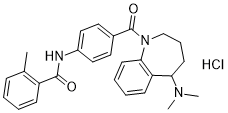
|
| DC22009 | AZD5718 Featured |
AZD5718 (AZD-5718, AZD 5718) is a novel potent 5-lipoxygenase activating protein (FLAP) inhibitor with binding IC50 of 6.3 nM; exhibits LTB4 inhibition in human whole blood assays with IC50 of 39 nM; reduce the production of pro-inflammatory and vasoactive leukotrienes both in vitro and in vivo.
More description
|
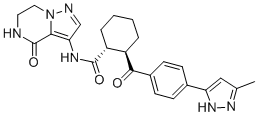
|
| DC23797 | IU1-47 Featured |
IU1-47 is a potent, selective small-molecule inhibitor of USP14 with IC50 of 0.6 uM, shows 10-fold more potent over IU1 and retains specificity for USP14; accelerates the rate of degradation of wild-type tau, the pathological tau mutants P301L and P301S, and the A152T tau variant in primary neuronal cultures, a specific residue in tau, lysine 174, is critical for the IU1-47-mediated tau degradation by the proteasome; stimulates autophagic flux in primary neurons.
More description
|

|
| DC22143 | MALAT1-IN-1 Featured |
MALAT1 inhibitor 5 (Malat1 inhibitor 5) is a selective small molecule targeting of Metastasis-associated lung adenocarcinoma transcript 1 (Malat1/MALAT1 mouse/human), a highly conserved long non-coding RNA; does not affect Neat1 lncRNA levels.
More description
|

|
| DC23748 | ML372 Featured |
ML372 is a small molecule SMN modulator that increases SMN protein in patient fibroblasts with EC50 of 37 nM; possesses good potency, pharmacokinetics, tolerance, and CNS penetration that are able to increase levels of SMN protein in several model cell lines; increase SMN protein levels in vivo, restore motor function, and prolong survival of SMNΔ7 SMA Mice; improves the righting reflex and extended survival of a severe mouse model of SMA.
More description
|

|
| DC10911 | CCT241736 Featured |
CCT241736 is a novel, orally bioavailable Dual FLT3-Aurora Kinase Inhibitor.
More description
|
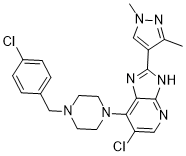
|
| DC11453 | Bz-Nle-Lys-Arg-Arg-AMC Featured |
Bz-Nle-Lys-Arg-Arg-AMC is a substrate for dengue virus NS2B-NS3 and yellow fever virus NS3 protease.
More description
|
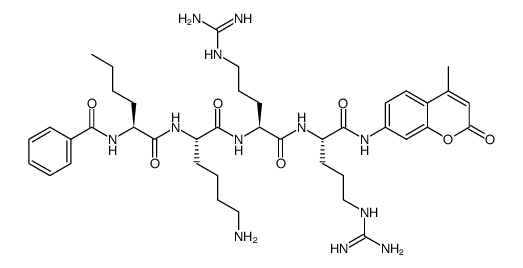
|
| DC22869 | E3 Ligand-Linker Conjugate 3(E3 Ligase Ligand-Linker Conjugates 19) Featured |
An E3 ligase ligand-linker conjugate for PROTAC.
More description
|

|
| DC10863 | Bis(tributylammonium) difluoromethylenediphosphonate Featured |
Bis(tributylammonium) difluoromethylenediphosphonate
More description
|
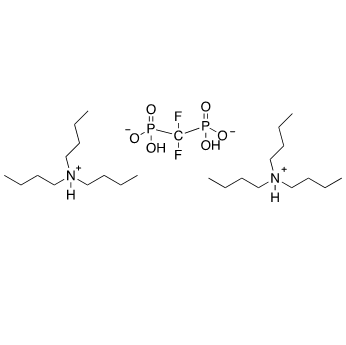
|
| DC36237 | Afobazol HCl Featured |
Afobazole is a multi-targeted anxiolytic drug with neuroprotective activities. It binds to the sigma-1, melatonin MT1, and MT3 receptors, as well as monoamine oxidase A (MAO-A, Kis = 5.9, 160, 0.97, and 3.6 µM, respectively, in a radioligand binding assay). Afobazole (5 mg/kg) decreases the latency to enter, as well as increases the number of entries into and percentage of time spent in, the open arms of the elevated plus maze, indicating anxiolytic-like activity in passive stress-coping BALB/c, but not active stress-coping C57BL/6, mice. It decreases stroke volume and neuronal and oligodendroglial cell death in the brain in a rat model of ischemia induced by middle cerebral artery occlusion (MCAO) when administered at doses of 0.3 and 3 mg/kg.
More description
|

|
| DC12029 | BAY-299 Featured |
BAY-299 is a potent and selective inhibitor of the bromodomain and PHD finger-containing (BRPF) family protein BRD1 (IC50 = 6 nM).
More description
|

|
| DC28370 | Dabuzalgron Featured |
Dabuzalgron (Ro 115-1240) is an orally active and selective α-1A adrenergic receptor agonist for the treatment of urinary incontinence. Dabuzalgron protects against Doxorubicin-induced cardiotoxicity by preserving mitochondrial function.
More description
|

|
| DC43032 | CYM-5520 Featured |
Novel allosteric agonist of Sphingosine 1-phosphate receptor 2 (S1PR2)
More description
|
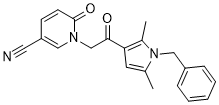
|
| DC21449 | OSMI-1 Featured |
OSMI-1 is a cell-permeable, small molecule O-GlcNAc transferase (OGT) inhibitor with IC50 of 2.7 uM.
More description
|
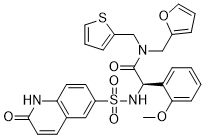
|
| DC12428 | AUNP-12 Featured |
AUNP-12 (Aurigene-012) is a PD-1 inhibitor peptide, blocks the PD-1/PD-L1, PD-1/PD-L2 and PD-L1/CD80 pathways.
More description
|
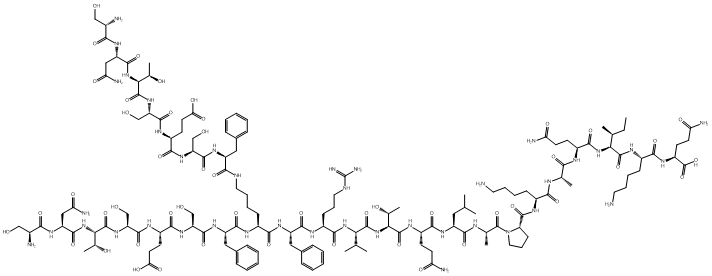
|
| DC12031 | ARS-1630 Featured |
ARS-1630 is the R-conformational atropisomer of ARS-1620, 1,000-fold less potent than ARS-1620 (1.2 ± 0.6 M-1s-1) and thus acts as a unique inactive control compound..
More description
|

|
| DC10738 | ARS-1323 Featured |
ARS-1323 is a novel inhibitor of mutant K-ras G12C.
More description
|

|
| DC20838 | BRD0705 Featured |
BRD0705 is a potent, paralog-selective GSK3α inhibitor with IC50 of 66 nM, 8-fold selectivity over GSK3β (IC50=515 nM).
More description
|
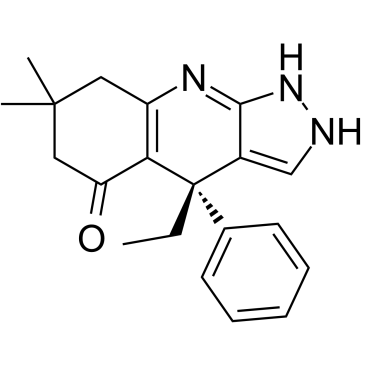
|
| DC11155 | ABX-1431 Featured |
ABX-1431 (ABX1431) is a highly potent, selective, orally available, CNS-penetrant monoacylglycerol lipase (MGLL) with IC50 of 14 nM (hMGLL).
More description
|

|
| DC10797 | AB-423 Featured |
AB-423 is the first-generation Hepatitis B Virus Capsid Assembly inhibitor, which was generally safe and well tolerated in Phase 1 healthy volunteer studies.
More description
|

|
| DC10666 | MDK-7933 Featured |
MDK-7933, also known as HDAC8-IN-1, is a HDAC8 inhibitor with an IC50 of 27.2 nM in cancer cell lines. MDK-7933 shows antiproliferative effects toward several human lung cancer cell lines (A549, H1299, and CL1-5). MDK-7933 was first reported in ChemMedChem. 2012 Oct;7(10):1815-24. MDK-7933 has CAS#1417997-93-3.
More description
|

|
| DC33586 | RGX-104 free form Featured |
RGX-104, also known as SB 742881, is a liver X receptor beta agonist with potential immunomodulating and antineoplastic activities. Upon oral administration, RGX-104 selectively targets and binds to LXRbeta, thereby activating LXRbeta-mediated signaling, leading to the transcription of certain tumor suppressor genes and the downregulation of certain tumor promoter genes. This particularly activates the expression of apolipoprotein E (ApoE), a tumor suppressor protein, in tumor cells and certain immune cells. This activates the innate immune system, resulting in depletion of immunosuppressive myeloid-derived suppressor cells (MDSCs), tumor cells and endothelial cells in the tumor microenvironment. This reverses immune evasion, enhances anti-tumor immune responses and inhibits proliferation of tumor cells.
More description
|
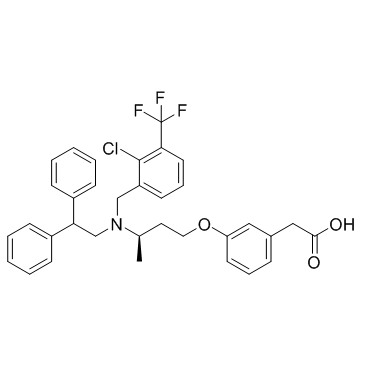
|
| DC10521 | (R)-IMPP Featured |
(R)-IMPP is a cell-permeable inhibitor of the secretion of proprotein convertase subtilisin/kexin type 9 (PCSK9; IC50 = 4.8 µM).
More description
|

|
| DC41803 | α-Conotoxin MII Featured |
α-Conotoxin MII is a highly potent and selective competitive antagonist for α3β2 subunit-containing nicotinic receptors (IC50 = 0.5 - 3.5 nM at α3β2 expressed in Xenopus oocytes). Also potently blocks β3-containing neuronal nicotinic receptors. Displays > 200-fold selectivity for α3β2 over α2β2, α4β2 and α3β4.
More description
|

|
| DC32393 | COL-144 (Lasmiditan) succinate Featured |
Lasmiditan, also known as COL-144 and LY573144, is a novel, centrally acting, highly selective 5-HT(1F) receptor agonist (K1=2.21 μM) without vasoconstrictor activity that seemed effective when given as an intravenous infusion in a proof-of-concept migraine study. Lasmiditan showed efficacy in its primary endpoint, with a 2-hour placebo-subtracted headache response of 28.8%, though with frequent reports of dizziness, paresthesias, and vertigo.
More description
|
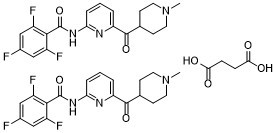
|
| DC31450 | Pexidartinib hydrochloride (PLX-3397) Featured |
Pexidartinib hydrochloride (PLX-3397 hydrochloride) is a potent, orally active, selective, and ATP-competitive colony stimulating factor 1 receptor (CSF1R or M-CSFR) and c-Kit inhibitor, with IC50s of 20 and 10 nM, respectively. Pexidartinib hydrochloride exhibits 10- to 100-fold selectivity for c-Kit and CSF1R over other related kinases. Pexidartinib hydrochloride induces cell apoptosis and has anti-cancer activity.
More description
|
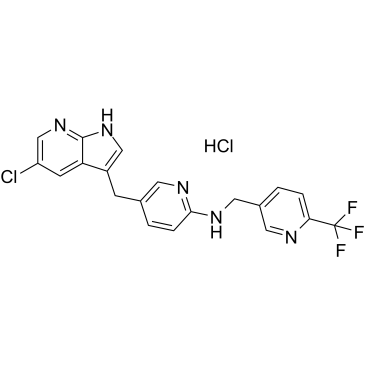
|
| DC28170 | Nemifitide diTFA Featured |
Nemifitide diTFA (INN 00835 diTFA) is a synthetic pentapeptide antidepressant with a potential for rapid onset of action. Nemifitide diTFA is a peptide analog of melanocyte-inhibiting factor (MIF). Nemifitide diTFA can cross the blood-brain barrier.
More description
|
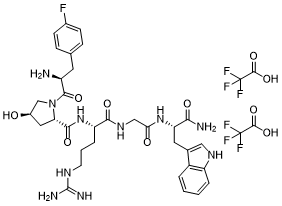
|
| DC21100 | Gusacitinib (ASN-002) Featured |
ASN-002 (Gusacitinib, ASN002) is a novel and potent dual inhibitor of SYK/JAK kinases with IC50 of 5-46 nM in biochemical assays.
More description
|
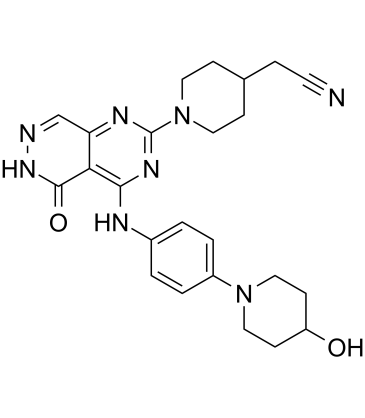
|